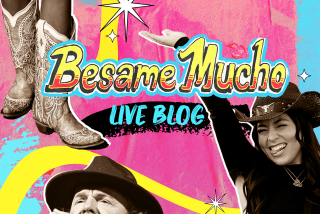The Fabulosos Cadillacs finally run out of gas
The message posted on the Web site of one of the most critically revered and commercially successful bands in Latin rock is loud and clear.
“Fabulosos Cadillacs have not broken up.”
The message is meant to dispel the persistent rumors that have been circulating for months about the alleged demise of one of rock en espanol’s key bands.
It matters more than ever, because the movement has been experiencing a creative drought for more than two years.
The Cadillacs’ last two studio albums -- 1997’s “Fabulosos Calavera” and 1999’s “La Marcha del Golazo Solitario” -- are the most accomplished efforts in the band’s 18-year career and examples of Latin rock at its very best.
These two records demonstrate the genre’s knack for absorbing foreign influences, blending them with traditional Latin roots and creating a sound as passionate as it is innovative.
The only Latin alternative band with comparable vision and energy is Mexico’s Cafe Tacuba.
So that reassuring message on the Web site is welcome reading. If only it were true.
The Cadillacs might not have officially broken up, but they effectively ceased to exist as a band last year, when the members began an indefinite hiatus. “Sometimes life puts you in a standby sort of mode,” explains Flavio Cianciarulo, 38, the group’s bassist and composer of such hits as “Mal Bicho” and “Matador.”
“And I guess we’re meant to develop stuff on our own.”
“It was just too many years of playing together,” adds singer-songwriter Gabriel Fernandez Capello, the band’s other major creative force.
“The group’s success gave us financial security, but it ended up being like a house that’s too comfortable for your own good.”
One of the key factors that brought the Cadillacs to a halt was Cianciarulo’s decision to leave his beloved Buenos Aires, a city whose melancholy vibe informs much of his music, and move last year to Monterrey, Mexico, his wife’s hometown.
Eager to explore his love of jazz, tango and South American folklore, Cianciarulo has just released a solo album, “El Marplatense.”
Capello also has a solo album: “Vicentico.”
Where “El Marplatense” has the feel of a cult record, “Vicentico” boasts the kind of pop sensibility that could allow Capello to develop a successful career as a soloist.
It will be released by BMG Latin in the U.S. some time early this year, followed by a brief U.S. tour.
“I trust the Cadillacs will make another album in a couple of years,” says Capello, 38. “On the other hand, I can’t imagine not recording more solo albums. I have other, more complex songs that I’d like to do on my own.”
“Vicentico” is light years away from the Cadillacs’ eclecticism. Still, the record functions as a consolation prize for the many fans awaiting a new release from the band.
Besides anchoring itself on Capello’s unmistakable sadder-than-sad vocals, the collection offers a back-to-basics version of the group’s trademark sound.
The emphasis on percolating, percussion-friendly rhythms such as the murga and the samba is there, as well as the Cadillacs’ connection with Argentine tango and nostalgia.
Much of the album works its charm in unassuming ways, from the love lament “La Unica Culpable,” to “Se Despierta La Ciudad,” a furious mambo with lightning-fast piano and lyrics that cleverly address Argentina’s current sociopolitical crisis.
In contrast to the Cadillacs, whose harsh sound delved freely into thrash metal, punk and ragamuffin, “Vicentico” suggests a sincere tribute to Latin lounge pop of the 1970s, when sensitive crooners such as Roberto Carlos and Nino Bravo wooed South American housewives with music that was warm, classy and melodious.
“There’s a lot of Roberto Carlos in this album,” Capello says. “I just love that ‘70s stuff, the way it allows you, emotionally speaking, to move back and forth between your childhood and your adult years.”
Would the sarcastic youngster who sang “Mi Novia Se Cayo En Un Pozo Ciego” (My Girlfriend Fell in a Septic Tank) with the ska-influenced Cadillacs back in 1987 approve of such an openly sentimental album?
“I think he would have liked it,” says Capello with a laugh.
Capello’s first major test as a solo performer came recently, when he performed the album live with his new band at a Buenos Aires theater.
“All of a sudden, I looked at the audience and saw a few of my bandmates watching the show,” he recalls. “And I couldn’t help thinking that it was a weird, totally distorted situation, almost out of a bad dream. But things are what they are.
“If part of this whole experience involves my friends coming to see me with a ‘What-am-I-doing-here’ expression on their face,” he adds hastily, “then so be it. Music ... always ends up saving the day in the end.”
*
(BEGIN TEXT OF INFOBOX)
Essential Fabulosos
Select U.S. discography
El Leon, (1992) Sony Int’l.
Vasos Vacios, (1994) Sony Int’l.
Rey Azucar, (1995) Sony Int’l.
Fabulosos Calavera, (1997) RCA Int’l.
20 Grandes Exitos, (1998) Sony Int’l.
La Marcha del Golazo Solitario, (1999) RCA Int’l.
Serie 2000, (2000) RCA Int’l.
More to Read
The biggest entertainment stories
Get our big stories about Hollywood, film, television, music, arts, culture and more right in your inbox as soon as they publish.
You may occasionally receive promotional content from the Los Angeles Times.










